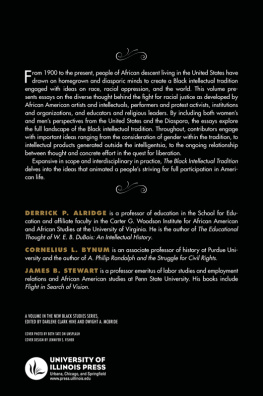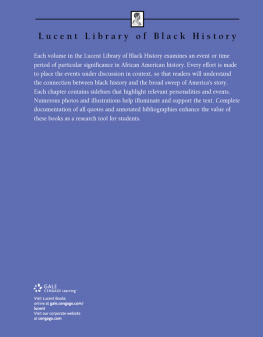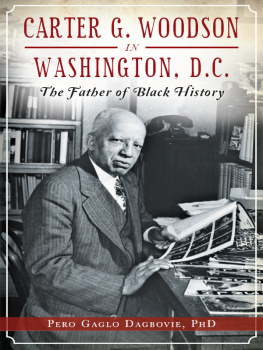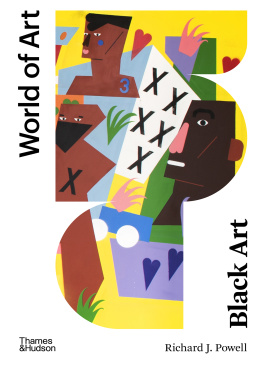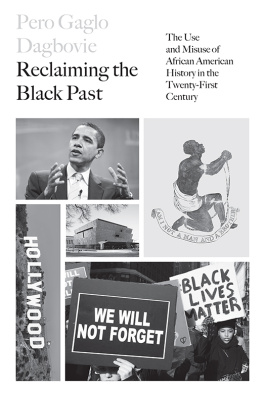Contents

Reclaiming the Black Past
Reclaiming the Black Past
The Use and Misuse of African American
History in the Twenty-first Century
Pero Gaglo Dagbovie

First published by Verso 2018
Pero Gaglo Dagbovie 2018
All rights reserved
The moral rights of the authors have been asserted
1 3 5 7 9 10 8 6 4 2
Verso
UK: 6 Meard Street, London W1F 0EG
US: 20 Jay Street, Suite 1010, Brooklyn, NY 11201
versobooks.com
Verso is the imprint of New Left Books
ISBN-13: 978-1-78663-203-6
ISBN-13: 978-1-78663-201-2 (UK EBK)
ISBN-13: 978-1-78663-202-9 (US EBK)
British Library Cataloguing in Publication Data
A catalogue record for this book is available from the British Library
Library of Congress Cataloging-in-Publication Data
A catalog record for this book is available from the Library of Congress
Typeset in Minion Pro by Hewer Text UK Ltd, Edinburgh
Printed by Maple Press, US
VD1_1
Contents
Introduction
The Enduring Mystique of Black History
None of Our Hands Are Entirely Clean
Obama and the Challenge of African American History
Honoring The Gift of Black Folk:
The Contested Meaning of Black History Month
Dramatizing the Black Past:
Twenty-first Century Hollywood Portrayals of Black History
Everything is Funny?:
Humor, Black History, and African American Comedians
So Long in Coming:
Political and Legal Attempts to Right Past Wrongs
Afterword
Displaying the Black Past
What do you do? asks someone I am meeting for the first time.
Like clockwork, I respond, I am a university professor.
What do you teach? is the next question posed to me in this familiar dialogue.
History, I say, trying to keep things as simple as possible.
Really? I love history, this eager conversationalist keeps the chitchat going, What type of history do you teach?
American history, I reply, in anticipation of what the next question will most likely be.
What area of American history?
Black history, I answer.
Oh.
I often find myself having this type of friendly small talk when first encountering people my age and older in a variety of settings. Professional historians are undoubtedly familiar with this type of exchange. Over the years, I have noticed that after meeting people, particularly white people, for the first time and telling them what I do for a living, they tend to share with me their ardent interest in popular subjects in United States history such as the Civil War, World War II, the American presidency, or some notable historical icon or monumental event. It is not uncommon for my new acquaintances to share with me a book (usually authored by a journalist with whom I am not familiar) that they have recently read or a documentary that they saw on the History Channel, A & E, American History TV, Military History, and, from time to time, PBS. They rarely, if ever, share with me tidbits of information that they have learned about my area of expertise. Contemporary black culture permeates through American life, but black history does not explicitly shape most Americans worldviews. The past experiences of black Americans, especially during the troublesome eras of slavery and Jim Crow segregation, do not make for friendly, lighthearted topics of conversation.
A different dynamic often occurs when engaging with elderly African Americans. I am almost always told a story about their experiences back in the day or an entertaining anecdote. Sometimes they fervently school me about how history repeats itself and how black Americas past and present are inextricable. I particularly enjoy these conversations because they allow me to practice oral history and probe into an insiders perspective.
If the facts of those playing amateur historians are what I perceive to be inaccurate or imprecise, I hardly ever bother to correct them. Instead, I customarily participate in these brief exchanges by attentively listening to my acquaintances rundowns of past events and personalities, nodding my head in appreciation of their curiosity about bygone days. After all, many people find history in its academic expression to be mundane, tedious, and off-putting. For those of my generation, this is epitomized by a popularly hilarious scene from the 1986 film Ferris Buellers Day Off when actor Ben Stein lectures to bored-to-death high school students about the Great Depression. When I have the opportunity to alter such perceptions about history, I make modest efforts to do so.
For a host of reasons, the numbers of young Americans earning bachelors degrees in history in the digital-centric twenty-first century is steadily declining. As cognitive psychologist and history education expert Sam Wineburg and others have argued, peoples lack of enthusiasm toward the study of history is in part related to how they were taught history in secondary school. Most werent and still arent taught the value of thinking historically or the benefits of unraveling a usable past. US high school history, often subsumed under the broad and illusive category of social studies, is regularly reduced to the memorization of so-called facts and important names and dates. Time and time again, high school students are expected to demonstrate their historical knowledge by taking multiple choice, fill-in, and short-answer tests based upon so-called objective information from dry and conventional textbooks in which African Americans are at best discussed during slavery and Reconstruction and in the sidebars. With the exception of high school students in Philadelphia who, since 2005, have been required to take an introductory course in African American history before graduating, countless millennials and centennials or postmillennials were most likely first introduced to notions of African American history during their schools annual perfunctory and token Black History Month activities.
Nonetheless, historyas memory, compelling and often unimaginable facts and details, the tales of influential people, artifacts that are housed in museums, and a record of consequential past eventsdoes indeed fascinate many Americans across ethnic and generational lines. History is appealing in part because we all have our own personal histories that have profoundly influenced who we are and will become. Millions of Americans have used services offered by Ancestry.com LLC, and other genealogy companies and television shows like PBSs Finding Your Roots with Henry Louis Gates, Jr. and Genealogy Roadshow; NBC-TVs and The Learning Channels Who Do You Think You Are? are popular. From family customs to national holidays to ethnic observances, historical traditions and rituals shape Americans everyday lives.
If Beckers Mr. Everyman, as he contended, had trouble pinpointing the mass of unrelated and related information and misinformation, then it would surely be impossible for Americans living in the information-overloaded twenty-first century to fully discern or explain how they know what they think they know about the past.
But one thing is a reasonably safe bet. In the late twentieth century and the twenty-first century, many Americans perceptions of US history, including African American history, have not necessarily been shaped by professional historians but instead have been strikingly impacted by popular culture, journalists, political pundits and politicians, Hollywood films, and, of course, information from the easily accessible Internet.



